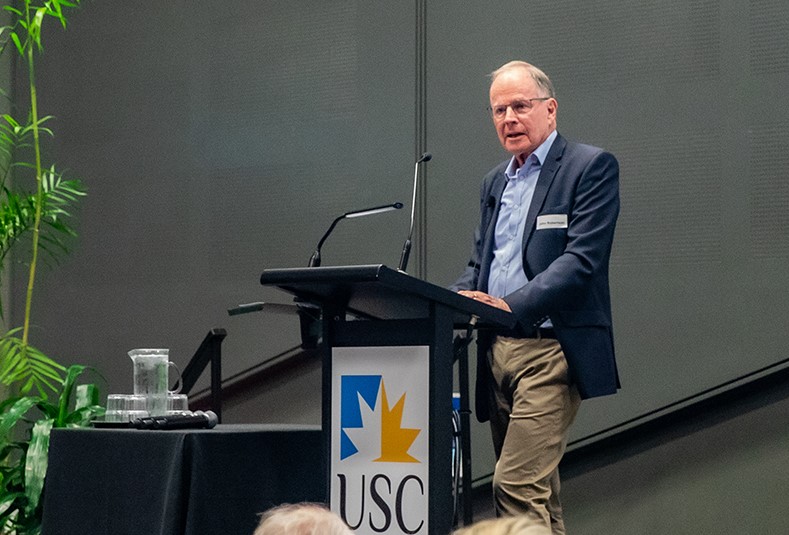Tough measures that put more young offenders behind bars are failing and will only lead to an increase in crime, a former president of the Children’s Court of Queensland has warned.
In a rare broadside from a senior judicial figure, former District Court judge John Robertson said jailing children and youths was not working.
Mr Robertson, who is chair of the Queensland Sentencing Advisory Council, said the “lock ’em up” attitude amplified on social media and putting pressure on politicians, was creating a hardened group of repeat offenders.
He called for increased funding for early intervention for children identified as at risk of criminality.
Mr Robertson also advocated a greater focus on rehabilitation programs, including integration of youth in purposeful work and mentoring.
The highly respected former judge was speaking at a community event hosted by USC’s School of Law and Society and the Sunshine Coast Community Foundation on Tuesday night. He formerly presided in the Maroochydore District Court.
It comes as the State Government considers repurposing the watchhouse at Caloundra Police Station as a youth remand centre.
“The present system is broken … we can’t seem to get past the lock-‘em-up model and for some reason people on social media like this, particularly if they (young offenders) are not like us and certainly if they are not someone we know,” Mr Robertson (pictured below) said.

He said some of the myths perpetuated by social media included that Queensland was in the grip of a crime wave created by a group of young thugs.
Australian Bureau of Statistics figures show child offenders are responsible for one in 10 crimes in Queensland and juvenile crime rates have fallen greatly over the past 20 years.
Despite this, Premier Annastacia Palascczuk announced tough new measures in February to combat youth crime, including a trial of GPS trackers and changes to bail laws for repeat juvenile offenders.
Help keep independent and fair Sunshine Coast news coming by subscribing to our free daily news feed. All it requires is your name and email. See SUBSCRIBE at the top of this article
On the Sunshine Coast, statistics show crime committed by children fell about 5 per cent over the past two years, and the majority of crimes were committed by offenders aged 16 and 17, and were crimes against property, or related to drugs.
Despite the steady reduction in child crime, the rate of imprisonment for children has risen.
Mr Robertson said that while some magistrates made decisions that were “no good”, the court system stood tough on crime, particularly for repeat or violent offenders.
“It is a myth that serious crimes committed by young people … are not being met with proper punishment,” he said.
“It is simply not true: those who commit serious crimes are subject to strict supervision and often have been denied bail so have spent months or years on remand in custody awaiting their sentence, so often they have served their time before they are sentenced.”
Mr Robertson said it should be of great concern that at any given time, more than 30 per cent of children in detention centres were on remand.

“In addition, more than 70 per cent of offenders serving sentences in youth detention facilities are serving 12 months or less, so they are not serious, violent offenders,” Mr Robertson said.
He said short sentences did nothing to improve community safety or deter further offending, instead exposing young offenders to other criminal behaviours.
Mr Robertson said it was imperative that everything possible be done to keep children out of prisons and that policy makers and government properly fund early intervention and diversion programs.
He gave a paper to a Police Union conference in April on youth justice, outlining effective intervention and rehabilitation programs around the country that had adopted innovative approaches.
These included immersion and residential programs, integration of youth in purposeful work and mentoring and all had seen a decline in violent crimes and reoffending, he said.
Do you have an opinion to share? Submit a Letter to the Editor with your name and suburb at Sunshine Coast News via: news@sunshinecoastnews.com.au
“I do know this to be absolutely true: don’t build more detention centres if you want to reduce juvenile offending,” he said.
A census of Queensland child offenders undertaken by Youth Justice found 40 per cent of child offenders were completely disengaged from education, vocational training or work, 75 per cent were known to use at least one illicit substance and almost 40 per cent had been diagnosed with a least one mental health disorder.
A Queensland Treasury research brief released in April shows that the more risk factors a youth had, the more likely they were to offend.
Risk factors include having anti-social peers, a history of being abused, living in poverty or if a parent or carer is unemployed or involved in crime.
The same report says protective factors include a sense of responsibility, family support, school attachment and a strong cultural or community connection.





